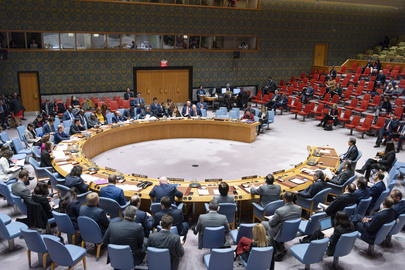Lebanon: Cholera fears for communities uprooted by war
A first case of highly infectious cholera virus has been detected in northern Lebanon, raising fears that those displaced by Israeli bombardment may already be at risk from the potentially deadly disease.
Head of the UN World Health Organization (WHO), Tedros Adhanom Ghebreyesus, said that a response plan had been activated to strengthen surveillance, contact tracing and water sampling.
The case was confirmed in Akkar, the country’s northernmost governorate.
Dr. Abdinasir Abubakar, Acting WHO Representative in Lebanon, expressed concerns that many of those who had fled the violence in the south had no protection from cholera, which thrives in unsanitary conditions.
“What we are worrying, actually is that displaced people for the current conflict have reached to the north, and if the cholera outbreak …spread to these new displaced people, it might spread very fast because some of those communities from the south and from Beirut, didn’t have any cholera immunity for the last 10 years. And it’s very…The risk of spread is very high.”
Some 1.2 million people have been uprooted by the war so far, according to the Lebanese authorities, which launched a cholera oral vaccination drive in August targeting 350,000 people which was interrupted by the ongoing escalation in violence, according to WHO.
The threat of cholera has presented yet another challenge for UN humanitarians and their partners working amid ongoing devastating airstrikes reported in eastern Lebanon overnight.
Ongoing Hezbollah rocket fire of Israel has also continued.
Risk of famine remains high across the entire Gaza Strip
To Gaza, where the risk of famine remains high everywhere across the enclave, one year into the war with Israel.
The latest UN-partnered food insecurity assessment for Gaza indicates that more than 1.8 million people are now experiencing “extremely critical levels of acute food insecurity”, because of the ongoing fighting.
The Integrated Food Security Phase Classification global initiative report said that conflict has displaced nearly two million people, destroyed 70 per cent of crop fields, wiped out livelihoods and local food production, caused the collapse of health services and severely restricted humanitarian access.
The panel’s experts also warned that acute malnutrition is at serious levels – 10 times higher than before the escalation of hostilities.
Nearly half a billion people live in conflict settings: UNDP
A full 455 million of the world’s poor live in countries affected by violent conflict which often has a catastrophic impact on efforts to bring people out of poverty.
That’s the worrying finding of a new report by the UN Development Programme (UNDP) with the University of Oxford, based on data from 112 countries.
The study found a staggering 1.1 billion people in acute poverty worldwide, prompting calls from the UN agency for additional resources and specialized development initiatives including “early recovery interventions” to “help break the cycle of poverty and crisis”.
Data from the report found that in countries where there’s conflict, more than one in four lacks access to electricity, compared to around one in 20 people elsewhere.
A similar trend is clear in child education, nutrition, access to water and sanitation and even child mortality – which is about eight per cent among poor communities in countries at war, compared with just 1.1 per cent globally.
In Afghanistan, the report’s authors noted that 5.3 million more people fell into poverty from 2015 to 2023. Data available today indicates that nearly two in three Afghans are impoverished.
Daniel Johnson, UN News
Music composed and produced by Joachim Harris. All rights reserved
Source of original article: United Nations (news.un.org). Photo credit: UN. The content of this article does not necessarily reflect the views or opinion of Global Diaspora News (www.globaldiasporanews.com).
To submit your press release: (https://www.globaldiasporanews.com/pr).
To advertise on Global Diaspora News: (www.globaldiasporanews.com/ads).
Sign up to Global Diaspora News newsletter (https://www.globaldiasporanews.com/newsletter/) to start receiving updates and opportunities directly in your email inbox for free.





























